
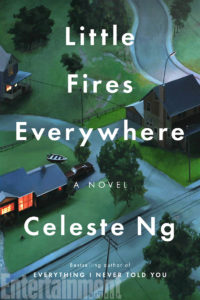
1. Little Fires Everywhere by Celeste Ng
(6 Rave, 2 Positive)
“..[a] delectable and engrossing novel … a complex and compulsively readable suburban saga that is deeply invested in mothers and daughters … What Ng has written, in this thoroughly entertaining novel, is a pointed and persuasive social critique, teasing out the myriad forms of privilege and predation that stand between so many people and their achievement of the American dream.”
–Laura Collins-Hughes (The Boston Globe)
Read an interview with Celeste Ng here
*
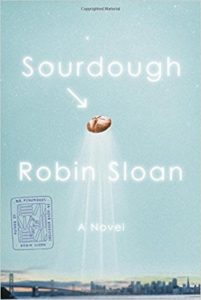
2. Sourdough by Robin Sloan
(5 Rave, 2 Positive, 2 Mixed)
“[Sourdough] is a beautiful, small, sweet, quiet book. It knows as much about the strange extremes of food as Mr. Penumbra did about the dark latitudes of the book community … I love that because Sloan has a pop-culture brain, and he gave it to Lois. Because his voice in her head and her mouth fits so beautifully into the time and place and moment he is writing about.”
–Jason Sheehan (NPR)
*

3. Dirt Road by James Kelman
(5 Rave, 2 Positive)
“Like the great protagonists of Russian fiction, Kelman’s characters, no matter how little money or formal education they possess, are lit up by their own sensibilities and ‘soul.’ Dirt Road is steeped in this tradition … Dirt Road is not only a novel about a boy’s journey through music away from the paralysis of grief, it is also about race. With ease, Kelman’s narrative moves away from his previous settings in Scotland and England and focuses on the realities of a country in which the divisions between black and white are livid and dangerous.”
–Kirsty Dunn (The Guardian)
Read an excerpt from Dirt Road here
*
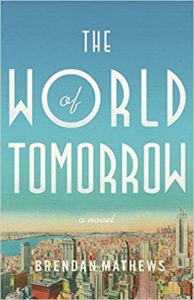
4. The World of Tomorrow by Brendan Mathews
(3 Rave, 4 Positive, 3 Mixed)
“The World of Tomorrow is a sweeping, impressive accomplishment. Perhaps it could have been 50 or so pages shorter, and the ghostly appearance of an Irish literary icon may push past the cusp of believability. Still, Mathews has written an insightful immigrant epic, not to mention a first-class literary thriller.”
–Tom Deignan (Booklist)
*

5. Forest Dark by Nicole Krauss
(5 Rave, 4 Positive, 3 Mixed, 3 Pan)
“What Forest Darkshows — with its bold reimagining of Kafka’s life, as well as its intimations that Nicole’s life might be something other than what she thinks it is — is that the distinction between authentic and inauthentic might not be as important as we believe. It’s a perfectly Kafkaesque vision, almost uncanny enough to be sublime.”
–Ruth Franklin (Harper’s)
Read an interview with Nicole Krauss here
**

1. A Disappearance in Damascus by Deborah Campbell
(6 Rave, 2 Positive)
“One of Campbell’s great skills as a writer — besides her formidable reporting chops — is her ability to clearly explain complicated politics without oversimplifying … The book is steeped in atmosphere and sensual details, bringing Damascus to vibrant life, a reminder that the war-torn neighborhoods we see in the news are only one part of a sophisticated ancient world … This important book opens our eyes to the lives of the people who are trying to find peace in a world of chaos.”
–Laurie Hertzel (The Minneapolis Star Tribune)
Read an excerpt from A Disappearance in Damascus here
*

2. Democracy in Chains by Nancy MacLean
(4 Rave, 5 Positive)
“MacLean persuasively weaves together biography, intellectual history, and political history to show how the public has been fooled by right-wingers who claim to value ‘liberty,’ but who actually intend the corporate takeover of public resources … While the book has all the juiciness of a conspiracy theory — it’s highly readable and absorbing with a cast of characters drawn as carefully as they would be in a novel — it is also painstakingly researched and deeply intelligent.”
–Anita Felicelli (The Los Angeles Review of Books)
*
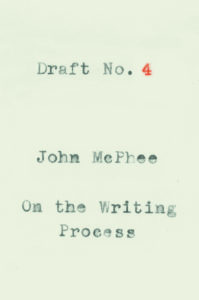
2. Draft No. 4 by John McPhee
(4 Rave, 5 Positive)
“ts combination of shop talk, war stories, slices of autobiography, and priceless insights and lessons suggests what it must be like to occupy a seat in the McPhee classroom … Assent, demur or file away for future reflection, Mr. McPhee’s observations about writing are always invigorating to engage with. And Draft No. 4 belongs on the short shelf of essential books about the craft.”
–Ben Yagoda (The Wall Street Journal)
*
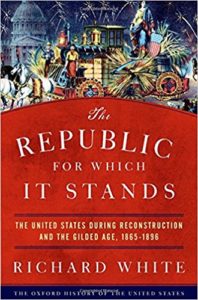
4. The Republic for Which it Stands by Richard White
(5 Rave, 2 Positive)
“The 10th entry in the series, covering the United States during Reconstruction and the Gilded Age, may be the most erudite and sweeping of them all — as well as among the most timely, reminding during a time of turmoil that the divisive tensions of race and class inequities, economic upheaval, and regional schisms have deep, tangled roots … a rich and breathtaking portrait of a country that, from Reconstruction on, really was under construction.”
–David M. Shribman (The Boston Globe)
*
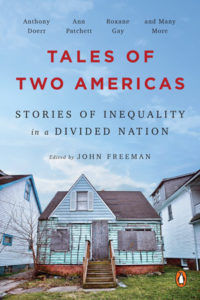
5. Tales of Two Cities, Ed. by John Freeman
(4 Rave, 1 Positive, 1 Mixed)
“…a dazzling assemblage of emerging and established writers offers insights that are straightforward or subtle, but always compelling … Each contribution stands out. Each voice is unique. The only common threads in the collection are theme and excellence … This anthology is spectacular and devastating and provocative.”
–Michael Kleber-Diggs (The Minneapolis Star Tribune)
Read an essay on America’s housing catastrophe by Karen Russell from Tales of Two Americas here
Read a poem by Lawrence Joseph from Tales of Two Americas here
***

